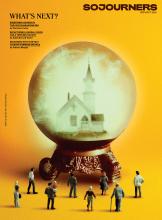WHEN AUTHOR AND film critic Sarah Welch-Larson was growing up, she wasn’t a horror movie fan. That started to change when, as a teenager, she had a fateful encounter with the James Cameron film Aliens on cable TV.
The movie’s hero, Ellen Ripley, played by Sigourney Weaver, “looked a lot like my mom and had a lot of the attitudes my mom has about some things,” Welch-Larson, who writes about faith and popular culture for the online publications Think Christian and Bright Wall/Dark Room, told Sojourners. “I was captivated by that character.” Two weeks later, Welch-Larson watched the first 1979 Alien movie, directed by Ridley Scott. It frightened her and she couldn’t get it out of her head.
Eventually Welch-Larson’s interest grew into a fascination with the series as a whole. Her new book, Becoming Alien: The Beginning and End of Evil in Science Fiction’s Most Idiosyncratic Film Franchise, looks at recurring themes of evil, greed, and destruction in the Alien films through the lens of theologian Catherine Keller’s 2002 book, The Face of the Deep: A Theology of Becoming, in which Keller examines the first two verses of Genesis.
“She writes a lot about God setting everything into relationship with each other. God’s saying there’s a relationship you have with the rest of the world and with other created beings around you,” Welch-Larson explains. “Once you start to deny those relationships, you’re saying they’re not as important as what God has created you to be, and Keller says that’s the source of evil.”
Read the Full Article

